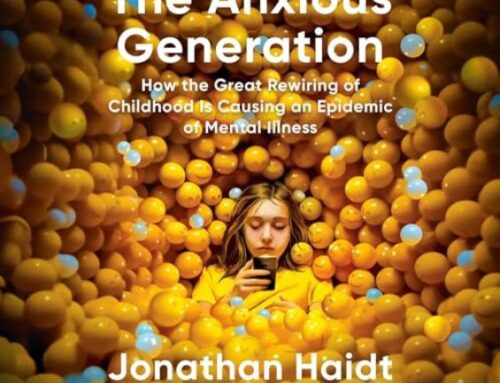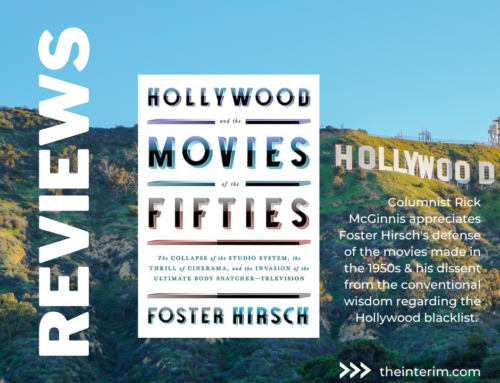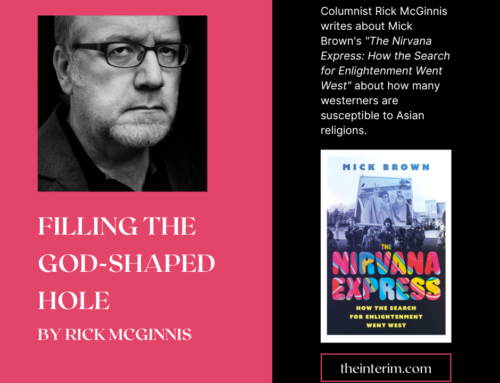 It’s easy to believe that society is falling apart, especially if you spend any time on social media. My liberal friends are certain that the earth is on the verge of an imminent ecological disaster – probably climate change, but they’ll take resource depletion or overpopulation in a pinch. My conservative friends fill their Facebook feeds with stories and memes about the threat of unchecked, invasive immigration, or warnings that the Vatican is wholly corrupted by pedophiles, globalist double agents – or both.
It’s easy to believe that society is falling apart, especially if you spend any time on social media. My liberal friends are certain that the earth is on the verge of an imminent ecological disaster – probably climate change, but they’ll take resource depletion or overpopulation in a pinch. My conservative friends fill their Facebook feeds with stories and memes about the threat of unchecked, invasive immigration, or warnings that the Vatican is wholly corrupted by pedophiles, globalist double agents – or both.
Both sides are convinced that the media is lying to them, that democracy is being choked to death by politicians and unelected insiders sabotaging the political process, and that some form of tyranny is just around the corner. The word “fascist” gets used a lot. Everyone seems to have agreed that they’ll live with a constant but apparently acceptable level of paranoia.
Someone might be right about something; if anyone is right about anything, we’re in a lot of trouble. But no one is trying to convince the other side that they should share their particular fears as much as they’re sharing the latest dismal “fact” or sobering meme with like-minded friends in a self-reinforcing loop.
This is where it would be helpful to discover common ground – to find a place where my friends’ concerns overlap on the way to diminishing their anxieties, both about the world and each other.
The problem is that I no longer think that’s possible.
In his recent book, The Fiery Angel, journalist and novelist Michael Walsh sums up our current situation as he sees it in a few sobering sentences: “The fascist impulse never lies far from the satanic. Only a stable society that does not have to worry about its own survival has the time or inclination to concern itself with relatively minor injustices, but even minor injustices can be fanned until they are suddenly everyone’s pre-occupation, freighted down with great moral weight until they become internal destabilizing elements. As the French Revolution shows, chaos emerges from order and, left unchecked, reigns until its destructiveness is as exhausted as the people upon whom it is inflicted.”
Walsh’s book is not unambitious – its subtitle is “Art, Culture, Sex, Politics and the Struggle for the Soul of the West,” a description that covers nearly everything I can think of that personally matters to me, at least. It is not, however, a book that seeks to heal wounds and find a middle ground between the warring factions Walsh sees in conflict today.
It’s aimed squarely at a conservative audience, and one that would call itself religious, or at least not hostile to religion in general or Christianity in particular. This would be obvious enough with the author’s repeated references to “cultural Marxism” as a malign influence, and the “satanic Left” as the faction furthering its directives.
Walsh’s book is an entry in the library of declinism, a genre that codified itself with Oswald Spengler’s The Decline of the West, published in two volumes just after the end of the First World War just in time to set the tone for the ensuing century.
But the genre really began almost a century and a half earlier, with Edward Gibbon’s The History of the Decline and Fall of the Roman Empire, a book that set about contemplating the widely scattered ruins of the Roman Empire – popular and picturesque spots for scholars and aristocrats touring Europe – and sought to find the cause of such a catastrophe. Gibbon anatomized Rome’s long, slow collapse over six volumes and 71 chapters, concluding in the end that the pitiful ruins that littered the hillsides of the shabby city that Rome was by the 18thcentury came about for four reasons: Time and nature’s gradual depredations, hostile attacks by barbarians and Christians (Gibbon was the first of that very modern type – the secular polemicist), the plundering of stones by locals and “the domestic quarrels of the Romans.”
The last was the most corrosive as far as Gibbon was concerned, and his diagnosis of Rome’s loss of civic virtue has become the keynote of hundreds of books and thousands of articles published in the last two centuries, as each subsequent generation has seen the imminent collapse of their own country or civilization echoing Gibbons’ narrative of Rome’s self-immolation.
Walsh, a one-time classical music critic, ranges freely over art, literature and music to illustrate his own story of western civilization’s crisis of confidence and the cultural movements that hurried it along. He cites fairy tales and novels, paintings and operas, referencing everyone from Dante to Mozart to Dracula to Shostakovich to Coppola. It’s an erudite overview that describes how Western culture, even at its most confident and triumphant, has always sensed how precarious its position was, and how easily it could be brought down from within.
It’s a battleground fought not by armies over land and sea, but in the arts, and Walsh is at his most despairing in a brief passage where he admits that neither side actually sees much intrinsic value in the cultural material they’re using for weaponry: “When it does not see them as frivolous and inconsequential, the contemporary Right views the arts with deep suspicion, as a plaything and propaganda tool of the Left. The Left, meanwhile, has explicitly employed the arts for propaganda purposes and, in some quarters, continues to view them as a tool for proselytizing the masses, but would prefer that nobody noticed. Both sides are, to a large extent, stuck in the twentieth century, the century in which politics superseded everything else in the global thrashing about that followed the collapse of European cultural and political hegemony after World War I.”
At the end of his book, Walsh helpfully provides a lengthy bibliography of books, plays, music and movies essential to his thesis. It’s a long list, much of which was still mandatory in the formation of what we used to call a “cultured” individual when I was young – Homer, Aristotle, Milton, Bach, Mozart, Keats, Goethe, Wagner, Ravel, Mann, Stravinsky and Cocteau. Included are movies that every budding cineaste scrutinized TV and rep cinema listings to see: Nosferatu, King Kong, Casablanca, The Manchurian Candidate, Rosemary’s Baby.
And this is where my own reasons for despair begin. Writing about culture for a conservative audience has confirmed for me how the Right describes art it’s happy to dismiss as old, weird, effete, foreign, corrupt, difficult, questionable, decadent, irrelevant or “elitist.” The Left will often employ the same words, adding others such as hegemonic, problematic, dated, insensitive, racist, sexist or culturally imperialist. The only difference is that one side’s dismissal is expressed mostly in passive terms, while the other comes from a more aggressive worldview that seems to think that losing much of this artistic legacy would be no great loss in the realization of a more ideal, equal and “just” society.
Walsh is certain that the loss of all this priceless cultural patrimony (that last word alone is problematic today) would be crippling for our society: “Not to understand culture, therefore, is not to understand history, and thus to be disarmed in the greatest fight in which Western culture has ever been collectively engaged: the struggle for its soul.”
With one half of the political divide dismissing much of that culture as simply too hard, the other eager to jettison it for being ideological dead weight, I’m doubtful that either side wants to do battle with anything more than their own ideologies and biases, and frankly they’d both deserve to lose. The problem is that the stakes are so much bigger than just two factions weakened by their own loss of civic virtue, and I long for time to prove me wrong.




